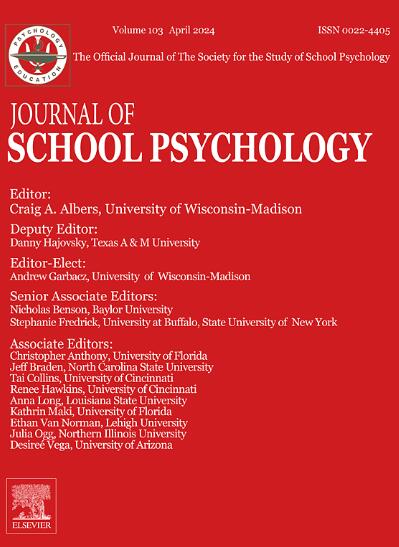Taking a playful approach to schoolwork: Associations with schoolwork engagement, school satisfaction, and school belonging
IF 4.1
1区 心理学
Q1 PSYCHOLOGY, SOCIAL
引用次数: 0
Abstract
The present study investigates how students in lower secondary education may playfully design their schoolwork with fun and competition (i.e., playful study design) to shape their schoolwork engagement, school satisfaction and school belonging, and whether school boredom moderates these effects. We hypothesize that using fun and challenge fosters school satisfaction and school belonging through increased engagement in schoolwork, and that these associations are stronger on days when school boredom is high. One-hundred Norwegian lower secondary school students participated in a daily diary study across ten school days. Results from multilevel analyses show that daily designing fun was positively associated with daily schoolwork engagement and indirectly associated with daily school satisfaction and daily school belonging. Similarly, daily designing competition was positively associated with daily schoolwork engagement and indirectly associated with daily school satisfaction (but not school belonging). School boredom moderated the association between designing fun (but not designing competition) and schoolwork engagement. The indirect association between designing fun and school satisfaction through schoolwork engagement was strongest on days when students reported high school boredom. Conversely, the indirect association between designing competition and school satisfaction through schoolwork engagement was strongest on days when students reported low school boredom. We discuss theoretical contributions and practical implications of the findings.
以有趣的方式完成学业:与学业投入、学校满意度和学校归属感的联系
本研究探讨了初中学生如何通过趣味性和竞争性的寓教于乐的学习设计(即寓教于乐的学习设计)来塑造他们的作业投入、学校满意度和学校归属感,以及学校无聊是否会调节这些影响。我们假设,使用乐趣和挑战可以通过增加对学业的参与来培养学校满意度和学校归属感,并且这些联系在学校无聊程度高的日子里会更强。100名挪威中学生参加了为期10天的每日日记研究。多层次分析的结果显示,日常设计乐趣与日常学业投入呈正相关,与日常学校满意度和日常学校归属感间接相关。同样,日常设计竞赛与日常学业投入呈正相关,与日常学校满意度间接相关(但与学校归属感无关)。学校无聊调节了设计乐趣(但不包括设计竞争)和学业投入之间的联系。设计乐趣和学校满意度之间的间接联系在学生报告高中无聊的日子里表现得最为明显。相反,设计竞赛和学校满意度之间的间接联系在学生报告学校无聊程度较低的日子里最为明显。我们讨论了这些发现的理论贡献和实际意义。
本文章由计算机程序翻译,如有差异,请以英文原文为准。
求助全文
约1分钟内获得全文
求助全文
来源期刊

Journal of School Psychology
PSYCHOLOGY, EDUCATIONAL-
CiteScore
6.70
自引率
8.00%
发文量
71
期刊介绍:
The Journal of School Psychology publishes original empirical articles and critical reviews of the literature on research and practices relevant to psychological and behavioral processes in school settings. JSP presents research on intervention mechanisms and approaches; schooling effects on the development of social, cognitive, mental-health, and achievement-related outcomes; assessment; and consultation. Submissions from a variety of disciplines are encouraged. All manuscripts are read by the Editor and one or more editorial consultants with the intent of providing appropriate and constructive written reviews.
 求助内容:
求助内容: 应助结果提醒方式:
应助结果提醒方式:


